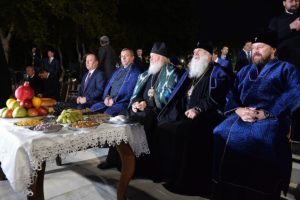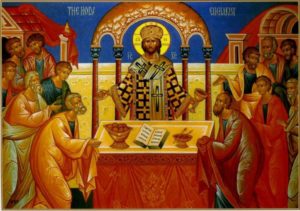14th Sunday after Pentecost — EUCHARIST
In the name of the Father, and the Son, and the Holy Spirit. Dear brothers and sisters:
The parable about those called to the ‘feast’ is a continuation of last weeks sermon about evil wine-dressers. These parables tell us about the severity of God’s judgement and the possibilty of the «falling away of those who were certain of having been selected». Man’s relationship to God is depicted in the parable, to His blessings, to His ‘Blessed Feast’ of sacrificial love! The unification of God with people is depicted by the Bible’s ‘Wedding Feast’, and established thanks to the Son of God taking human form. Our Heavenly King — God the Father — organized the ‘union’ between His Son and the Church, with all of us, and is inviting us to the ‘Feast’.
Those who were called, and refused with justification: «I must work, I must take care of business, I must work in the field, I must trade, forgive me, I can not come»; one can understand in a human way, because they are not lazy, parasites or drunkards. They have good intentions. They work with their hands, are useful and get paid. However, their hierarchy of values in confused, that is to say, for them, God is not in the first place. They may be compared to idolworshipers for whom work is their idol. But they have lost, and were left without the most important reward, which is ‘Eternity’.
Let us ponder how we perceive ‘the wedding feast’? In ancient times in the East, to decline an invitation from a well known person, was very dangerous. It could bring much unpleasantness and sorrow. When the ‘tzar’ organized a wedding feast for his son, it was a social and governmental event. It was a great honour to be invited; not only because a person could be among the affluent, but because of the importance of being in the tzar’s favour.
However, in todays parable, the invited guests did not wish to go to the tzar’s feast. They showed no interest in the feast. Similar to peoples attitude towards Christ, in our time. All christians are invited to God’s Wedding. This unusual wedding feast has a beginning, but no end. In the Orthodox Church this happens at the most important service to God, which in Greek is called by the name ‘EUCHARIST’, which first means ‘thanksgiving’. A christian can participate in it every Sunday. Christ Himself is waiting in the temple and is calling us. However, do we respond positively to this call? Unfortunately, not all of us, and not everytime. Here is an example of refusal nowadays, to Christs invitation. Many people listen attentively and with great interest to discussions about politics, finances, business, but are completely indifferent and even get annoyed and irritable if someone talks to them about spiritual themes, about ‘Eternal Life’. If we are absent from ‘Liturgy’ without a valid excuse, we then remove ourselves from Christ and His Church.

Ancient Eastern tradition in our days. Patriarch and members of the delegation at a reception with the head of state in Central Asia
When those who are called decline because of worldly cares, then those who are unsucessful in life, people from the streets, and lanes, both kind and mean are invited. One person, arriving at the feast, is more or less chased away. The tzar sees this person who is not dressed properly for the wedding and asks him: «my friend, how did you enter here without a wedding garment?» (Math. 22,12). But, he does not answer, because there is nothing to say, as he could not change into new clothing. Then, he is cast into eternal darkness, where there is crying and gnashing of teeth, where is punishement.
Why does this happen to this person? It is important to understand that people who attended wedding feasts in the Old East, had to remove their everyday clothes, wash off the dirt from the road with water and perfume, and make themselves as presentable as possible. A person’s change, when using Church language is called ‘repentance’ because a person washes himself internally and expresses a will not to sin. However, when a person tries to sneak into the feast, or take a place in ‘The Church’ , without internal repentance, then it is a path leading to a dead-end, which leads to ruin, as described in todays parable.
Today, Christs very stern words wring loudly «Many are called, few are chosen» (Math, 22:14). Therefore, as apostle Paul tells us: «let us put on tender mercies, kindness, humility, meekness, longsuffering» (Colossians 3,12). Let us not forget, when going to the temple to partake in the ‘Holy Mysteries’ of the Eucharist, not worry about the beauty of our outer clothing but more importantly that which beautifies our soul. Amen!
Sept. 2, 2018




 Save as PDF
Save as PDF